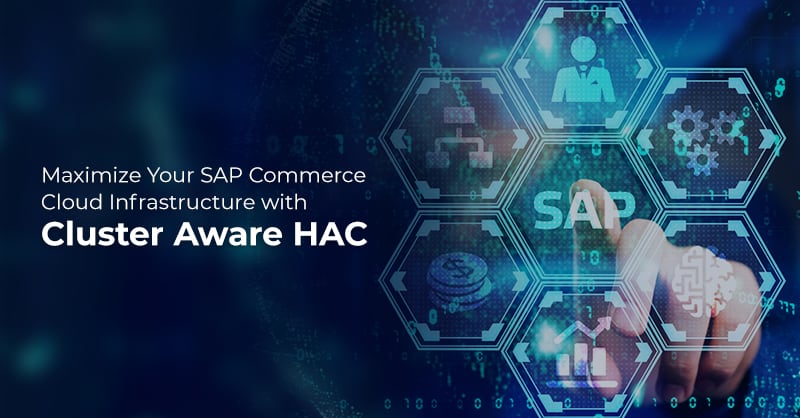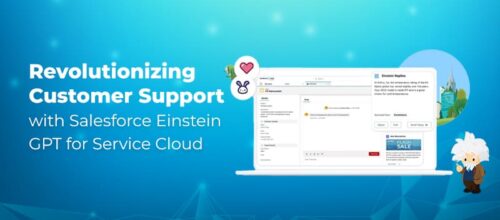Maximize Your SAP Commerce Cloud Infrastructure with Cluster Aware HAC

Written by Poonam Chandersy
Technical Content Writer
February 13, 2023
Features of HAC Cluster Aware Extension
Hybris Administrative Console (HAC) is an essential tool for managing and monitoring an SAP Commerce Cloud infrastructure along with the commerce solutions. It provides a centralized interface for managing the entire SAP Commerce Cloud platform, making it easier for administrators to perform various tasks, such as configuring servers, managing users, and monitoring system performances.
A key feature of the Hybris Administrative Console – HAC Cluster Aware Extension – is its ability to provide cluster-aware functionalities. In a clustered environment, the SAP Commerce Cloud platform can run on multiple nodes, which can provide better performance and scalability. At its core, the HAC provides a centralized interface and various functionalities that are designed specifically for cluster-aware installations, making it easier to manage and monitor all the nodes in a cluster. This includes the ability to view the status of each node, as well as detailed information about the configurations of each node.
Due to security reasons in SAP Commerce Cloud CCV2 Environment, HAC cannot be deployed on the frontend nodes/API Nodes and background processing nodes. Since it is a time-consuming process to run the same changes on all the nodes such as property configuration or script execution or cache monitoring or thread dump or JDBC logging, the goal of this extension is to provide cluster-aware features to have a single interface to update and monitor all the nodes.
Following are some of the cluster-aware features of the Hybris Administrative Console Cluster Aware Extension that help to manage and monitor the data between the nodes:
- Cluster Scripting Engine
- Cluster Configuration Properties
- Cache Monitoring
- Cluster Thread Dump
- Cluster JDBC Logging
Cluster Scripting Engine
A Scripting Engine support allows users to execute logic written in scripting languages in run time without restarting the SAP Commerce Cloud Server. The scripting engine thus saves time and makes it possible to improve existing logic like cron job, task engine, and other similar tools. Scripts may be stored in various repositories like a database based on the Script model, classpath, file system, or even in a remote repository, for example Gists at GitHub or can also be executed on the fly as a snippet without being stored. In SAP Commerce Cloud CCV2 environment, if we need to execute any drools scripts in all nodes or specific node groups is not possible. By using HAC Cluster Aware Extension, the same can be achieved. For example, using this extension, we can execute a script to disable a specific interceptor in the Storefront node group or API Node group.
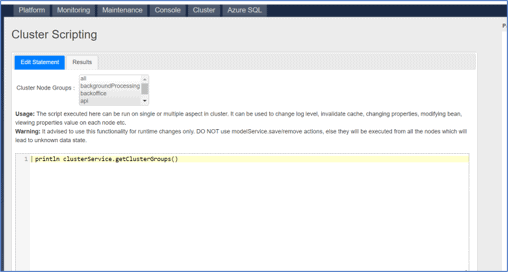
Cluster Configuration Properties
The Cluster Configuration Properties provides a list of all the currently set SAP Commerce Cloud properties and their values. The Cluster Configuration tab allows users to add or update the configurations in each node group. SAP Commerce Cloud doesn’t allow users to update values of configuration in specific node groups without this feature. For example: if a user wants to change the endpoint value only in Storefront nodes and not on the Backoffice node – this feature is a prerequisite.
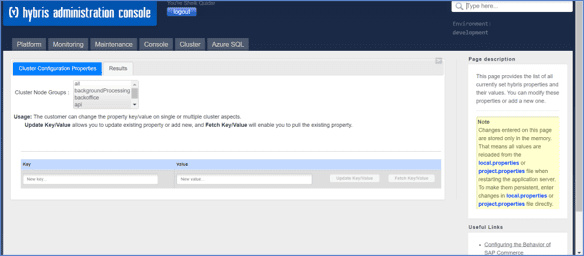
Cache Monitoring
The Cache page provides details about the cache that is currently enabled on the platform. This page displays the details about the previous cache or the SAP Commerce Cloud Region Cache, depending on which one is enabled. This tab allows users to Monitor or Clear Caches in each node group. SAP CCV2 doesn’t allow users to clear the cache in specific node groups for specific regions. For example, if a user wants to clear the cache of Storefront nodes for price cache, they are unable to do so without this feature.
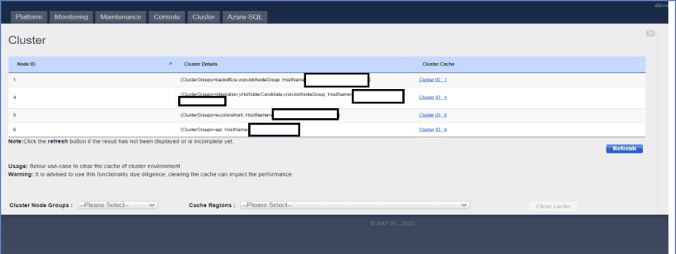
Cluster Thread Dump
The Thread Dump page provides a thread dump that is useful for debugging and support purposes. SAP CCV2 doesn’t allow users to take thread dump on individual node groups. Whereas extension allows users to take a thread dump on individual node groups.
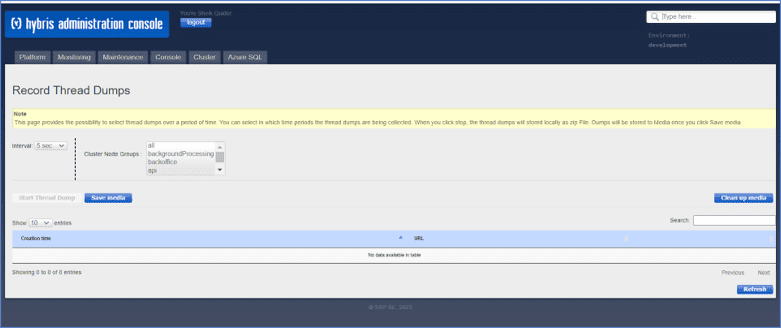
Cluster JDBC Logging
Enabling and Disabling JDBC Logging
Users can enable or disable JDBC logging by using SAP Commerce Cloud Administration Console, Java code, or through the configuration properties file. Enabling or disabling JDBC logging in SAP Commerce Cloud Administration Console or by using Java code has a run-time effect only and logging is set back to default after an SAP Commerce Cloud restart. However, enabling or disabling JDBC logging through the configuration properties file has a persistent effect and logging is enabled or disabled after an SAP Commerce Cloud restart.
When JDBC logging is enabled, it reduces performance, since every single database statement being logged results in a delayed response from the database. It is advisable to enable JDBC logging only when needed.
The tab enables users to start logging to the configured log file and download it. If traces are enabled, then a SQL comment is added to each statement with the Java stack tracing it from where the statement is being called. It is essential to continue logging even when not required to avoid performance issues. Also, users must clear the log files when they are not needed. SAP CCV2 doesn’t allow users to take a JDBC log on individual node groups. Extension feature Cluster JDBC logging allows users to take a JDBC log on individual node groups.
Conclusion
In a nutshell, the Hybris Administrative Console Cluster Aware Extension is an essential tool for managing and monitoring solutions in the SAP Commerce CCV2 environment. Also, its cluster-aware features make it easier to manage and monitor the entire platform in a clustered environment. Whether you are a seasoned administrator or just starting out, Royal Cyber’s certified SAP Commerce experts can assist you with Hybris Administrative Console’s Cluster Aware Extension tools you need to keep your SAP platform running smoothly.
Recent Blogs
- Learn to write effective test cases. Master best practices, templates, and tips to enhance software …Read More »
- In today’s fast-paced digital landscape, seamless data integration is crucial for businessRead More »
- Harness the power of AI with Salesforce Einstein GPT for Service Cloud. Unlock innovative ways …Read More »
